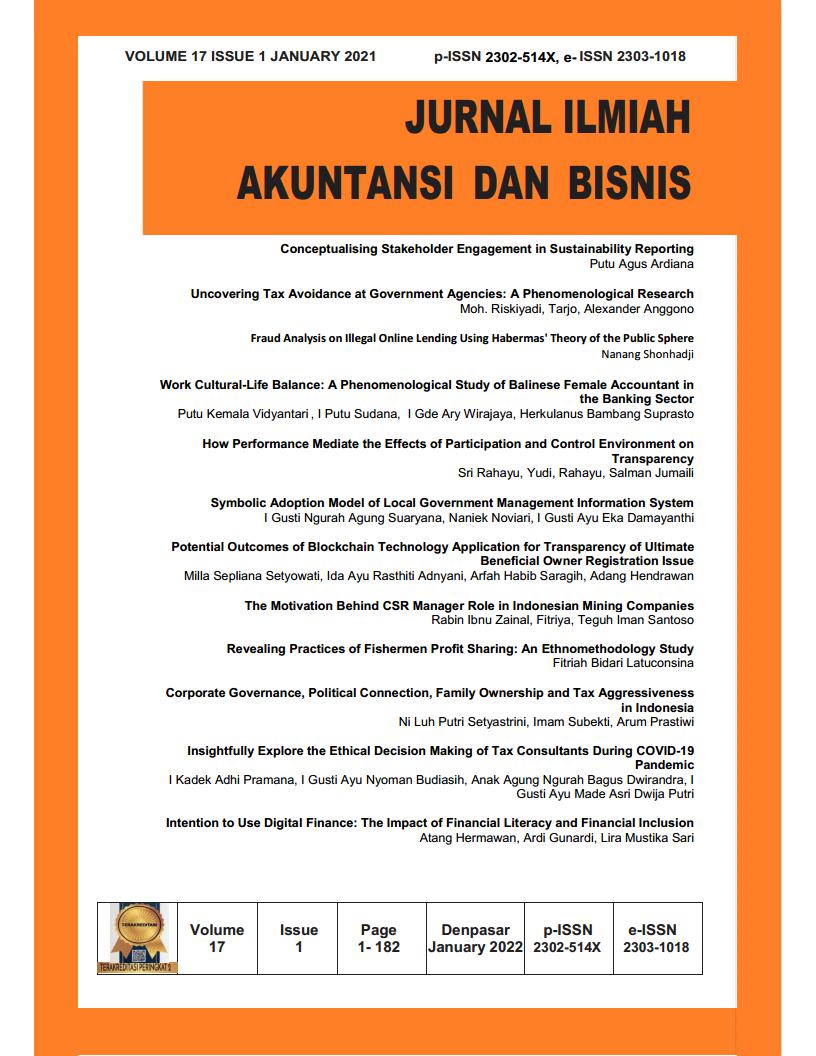Potential Outcomes of Blockchain Technology Application for Transparency of Ultimate Beneficial Owner Registration Issue
Abstract
The number of High Net-Worth Individuals (HNWI) in Indonesia is increasing. However, this increase was not followed by an increase in state revenues originating from the types of income taxes related to HNWI. This issue can be overcome by applying blockchain technology. This study aims to investigate the potential outcomes of blockchain technology in the issue of Ultimate Beneficial Owner (UBO) registration. Blockchain as a technology can support tax modernization, but it has not been extensively studied. This study used a qualitative method, by using a post-positivist approach, by conducting a literature study and in-depth interviews with nine informants. The results of the study state that the potential outcomes for UBO registration consist of value delivery and risk mitigation. Value delivery is easier to realize than risk management. Both are still being discussed further to find solutions to maximize the potential outcomes.
Keywords: blockchain, UBO, value delivery, risk management, tax modernization
Downloads
References
Ali, S., Green, P., & Parent, M. (2009). The role of a culture of compliance in Information Technology governance. CEUR Workshop Proceedings, 459, 1–14.
Bal, Aleksandra. (2019). Taxation, Virtual Currency, and Blockchain. Alphen aan den Rijn: Kluwer Law International.
Chang, Victor, et al. (2020). How Blockchain Can Impact Financial Services – The Overview, Challenges and Recommendations from Expert Interviewees. Technological Forecasting & Social Changes 158 (2020) 120166.
https://doi.org/10.1016/j.techfore.2020.120166. Diakses Desember 2020.
Creswell, J. (2014). Research Design: Qualitative, Quantitative, and Mixed Methods Approaches (4th Edition). Amerika: SAGE Publications.
Cohen, et al. (2017). How Securitization Can Benefit from Blockchain Technology. Journal of Structured Finance, Vol. 23 No. 2, p. 51-54. https://www.emerald.com/insight/publication/issn/1741-0398. Diakses Juli 2020.
Doughty, K. (2000). The Myth or Reality of Information Technology Steering Committees. https://www.isaca.org/art3a.htm. Diakses pada November 2020.
Fettke, P. & R. Risse (2018). Blockchain: Wird eine Sog. “Real Time“ Tax Compliance Möglich?, Der Betrieb, pp. 1749, 1750. Diakses Desember 2020.
Gunadi. (2016). Panduan Komprehensif Ketentuan Umum Perpajakan (KUP). Jakarta: Bee Media Indonesia.
Hoffman, Michal Robert. (2018). Can Blockchain and Linked Data Advanced Taxation. University of Southampton. International World Wide Web Conference Committee, published under Creative Commons CC BY 4.0 License. ACM ISBN 978-1-4503-5640-4/18/04.
Husein, Yunus. (2020). Transparansi Beneficial Owner jadi Pintu Masuk. https://www.youtube.com/watch?v=nvUHjeTxjB8. Diakses pada Oktober 2020.
ITGI. (2001). Board Briefing on IT Governance. https://www.itgi.org. Diakses pada Desember 2020.
ITGI. (2003). Board Briefing on IT Governance. Diakses Juli 2020.
Karimia, J., et al. (2000). The Effects of MIS Steering Committees on Information Technology Management Sophistication. Journal of Management Information Systems. Vol. 17(2). pp. 207-230. Diakses pada November 2020.
Laurence. (2017). Blockchain for Dummies. Canada: John Wiley & Sons, Inc.
Majdanska, Alicja., Migai, Clement., dan Marta Olowska. (2018). High-Net-Worth Individuals: The Challenge for Tax Administrations, Financial Intelligence Units and Law Enforcement Agencies. Bulletin for International Taxation October 2018. International Bureau of Fiscal Documentation (IBFD). Diakses Juli 2020.
Mansury, R. (2002) Pajak Penghasilan Pasca Reformasi 2000. Jakarta: Yayasan Pengembangan dan Penyebaran Pengetahuan Perpajakan (YP4).
Pandiangan, Liberti. 2008. Modernisasi dan Reformasi Pelayanan Perpajakan, PT. Elex Media Komputindo, Jakarta.
Prasetyo, Kristan Agung (2020). Memajaki Orang Kaya, Solusi Krisis?. https://www.youtube.com/watch?v=DjOzKfbf5Qg. Diakses pada Oktober 2020.
Price, D. (2018). 5 Big Blockchain Issues: Security, Privacy, Legal, Regulatory, and Ethical. https://blocksdecoded.com/Blockchain-issues-securityprivacy-legal-regulatory-ethical. Diakses Desember 2020.
Saragih, Samuel Marin Fernando dan Milla Sepliana Setyowati. (2019). E-Readiness of Blockchain Technology in Modernization of Tax Administration in Indonesia. Proceedings of the 1st International Symposium on Indonesia Politics, SIP 2019, 26-27 June 2019. https://eudl.eu/doi/10.4108/eai.25-6-2019.2288017. Diakses November 2020.
Utama, Muhammad Putrawal. (2018). Teknologi Blockchain dalam Transfer Pricing: https://news.ddtc.co.id/teknologi-blockchain-dalam-transfer-pricing-11998. Diakses Juli 2020.
Viriyasitavat, W. & Hoonsopon, D. (2018), Blockchain Characteristics and Consensus in Modern Business Processes. Journal of Industrial Information Integration, doi: 10.1016/j.jii.2018.07.004. Diakses Desember 2020.
Wang, Y., et al. (2019). Understanding Blockchain Technology for Future Supply Chains: A Systematic Literature Review and Research Agenda. Supply Chain Management, Vol. 24 No. 1, pp. 62-84, doi: 10.1108/SCM-03-2018-0148. Diakses Desember 2020.
Weill, P. & Ross, J.W. (2004). IT Governance on One Page. p. 15. Diakses Oktober 2020.
Yafi, Muhammad. (2020). Wawancara Mendalam pada 22 September 2020 via Zoom Cloud Meetings. Blocktogo Indonesia.
Young, R. C. & E Jordan. (2003). Passion & IT Governance. 7th Pacific Asia Conference on Information Systems, Adelaide South Australia. Diakses pada November 2020.
Yu, Ting., Lin, Zhiwei Stanley., & Qinliang Tang. (2018). Blockchain: Introduction and Application in Financial Accounting. Journal of Economic Literature (JEL) Classification: D82; 614; M40; O33. https://ssrn.com ssrn.com//abstract abstract==3258504. Diakses Desember 2020.




















